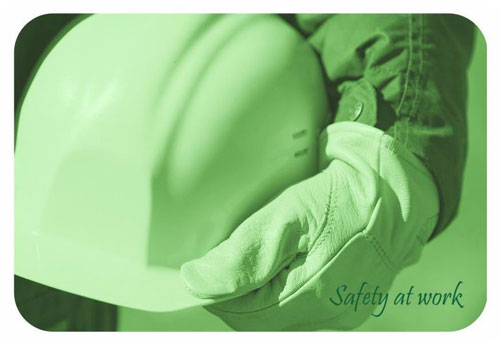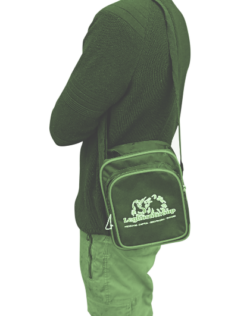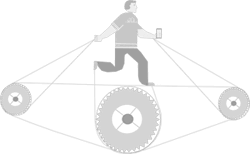Promote and implement the policy of respect in the world
of production and sale of security seals
Respect is the main founding value on which all of LeghornGroup’s activities are based: respect for the individual, for the community with which we interact and to whose development we actively contribute and, last but not least, respect for the environment and its resources.
Respect for the environment, in particular, is a set of practices and attitudes aimed at reducing the negative impact of human activities on the ecosystem.
Being mindful of adopting sustainable behaviours, such as recycling, using renewable energy, conscious consumption, and reducing waste.
Environmental respect is essential for safeguarding the health of the planet and future generations
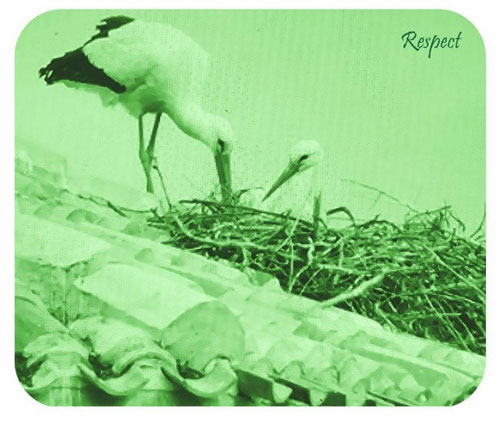
Respect is the main founding value on which all of LeghornGroup’s activities are based: respect for the individual, for the community with which we interact and to whose development we actively contribute and, last but not least, respect for the environment and its resources.
Respect for the environment, in particular, is a set of practices and attitudes aimed at reducing the negative impact of human activities on the ecosystem.
Being mindful of adopting sustainable behaviours, such as recycling, using renewable energy, conscious consumption, and reducing waste.
Environmental respect is essential for safeguarding the health of the planet and future generations
Reduce = use fewer resources
LeghornGroup operates a concrete reduction of the origin of waste through the adoption of appropriate lines of conduct, from instructions to its staff for the conscious use of energy (water, electricity, gas, but also inks and paper) within work spaces, to the use in the production of its own security products of plastic, metal and electronic materials in an increasingly optimized measure, without compromising quality and performance, through a constant process of revision and advanced engineering of the product.
With a view to reducing plastic waste and therefore its CO2 footprint, LeghornGroup has conducted research and development activities for years, which have led to the creation of reusable seals, with a high technological content, capable of offering high levels of security.
Similarly, seals made of biodegradable plastic are being developed. Unlike other plastics, this type of polymer does not even require recycling, but, if correctly collected and separated from the rest of the waste, it can decompose and be re-introduced into the environment. LeghornGroup is trying to optimize production processes to achieve a biodegradable plastic product that is able to meet the technical-functional requirements required for any security application and usage.
The adoption of these types of seals – reusable or biodegradable, in addition to enabling new functions, such as the traceability of goods, translates into a reduction in production of disposable seals, thus saving large quantities of plastic, i.e. plastic waste and CO2 every year.

Reuse = recover and reuse products when they have not yet become waste
LeghornGroup not only promotes the reuse of goods in regular office operations (for example, trivially, in the reuse of paper, or even of furnishings), but, and above all, uses recycled packaging as much as possible, from pallets brought to the end of their life to recycled cardboard for the production of its packaging.
Considering the high volumes handled during the year, the impact of this action is very high.
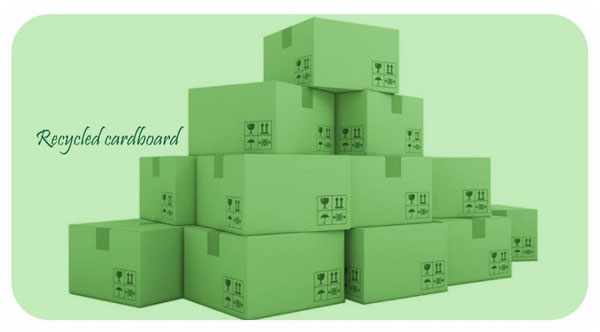
Recycle = transform, through industrial processes, a waste material
into new raw material to be reintroduced into the production cycle
Within its production processes of plastic or metal seals, LeghornGroup recovers 100% of production waste of material.
The plastic seals produced by LeghornGroup contain a minimum percentage of 30% of post-industrial recycled plastics, i.e. plastic obtained from production waste, a characteristic that is undergoing certification at the CSI. The CSI mark for products in recyclable materials allows demonstrating compliance with the reference standard (EN 13430 for packaging) adopted by the EU pursuant to directive 94/62, in turn included in the Environmental Code.
The use of post-industrial recycled plastics actively contributes to reducing the consumption of fossil raw materials.
LeghornGroup does not use non-recyclable plastics (for example poly-laminated materials, thermosetting plastic or elastomers) in its products.
There are 7 types of plastic:
1 – PET, or Polyethylene Terephthalate.
2 – HDPE, or High-Density Polyethylene.
3 – PVC, or Polyvinyl Chloride.
4 – LDPE, or Low-Density Polyethylene.
5 – PP, or Polypropylene.
6 – PS, or Polystyrene.
7 – Non-recyclable plastics.
There are 7 types of plastics currently used on the market.
Plastics numbered from 1 to 6 are all reusable.
The only non-recyclable plastic is number 7.
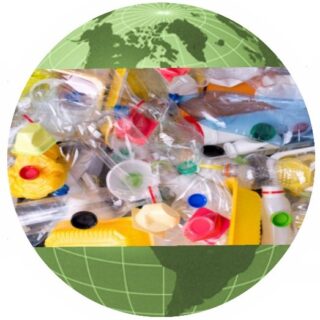
Here they are in detail:
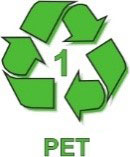 PET – Polyethylene Terephthalate
PET – Polyethylene Terephthalate
Marked with the number 1 inside the familiar triangle, this is the most common plastic. It is typically used for water and soft drink bottles and is essentially designed for single use. It’s very easy to recycle, but since it is denser than seawater, it poses a potential threat to our oceans. Proper disposal regulations must be strictly followed.
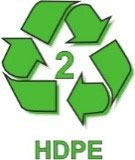 HDPE – High-Density Polyethylene
HDPE – High-Density Polyethylene
Marked with the number 2 inside the familiar triangle, this is a widely used plastic. It is commonly used for containers such as detergent and shampoo bottles, as well as toys. It is easily recyclable, and if thrown into the sea, it floats instead of sinking, making it easier to recover.
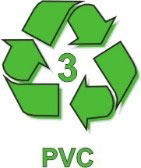 PVC – Polyvinyl Chloride
PVC – Polyvinyl Chloride
Marked with the number 3 inside the familiar triangle. This plastic is considered dangerous. It is used in many products and contains certain harmful phthalates. However, these same components are what make it flexible and resistant.
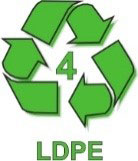 LDPE – Low-Density Polyethylene
LDPE – Low-Density Polyethylene
Marked with the number 4 inside the familiar triangle. This plastic has carbon chains that are far apart, which makes it very flexible. It is commonly used for drink cups. It is less recyclable compared to its high-density counterpart.
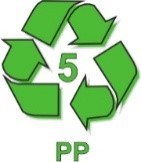 PP – Polypropylene
PP – Polypropylene
Marked with the number 5 inside the familiar triangle. It can withstand high temperatures up to 200°C. This plastic is both strong and flexible. It is widely used for oven trays, kettles, automotive parts, and especially yogurt containers. Due to its thermosetting component, it becomes more difficult to recycle.
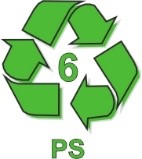 PS – Polystyrene
PS – Polystyrene
Marked with the number 6 inside the familiar triangle. Also known as Styrofoam, it is mainly used in packaging as shock protection. It is a very hazardous material. When exposed to heat sources, it releases carcinogenic substances that are harmful to living beings. Despite significant challenges, it is recyclable.
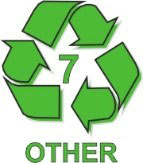 Non-recyclable plastics
Non-recyclable plastics
This is the most harmful and dangerous class of plastic for the environment.
These plastics must be disposed of in the general waste bin (non-recyclable waste).
They are most commonly used for containers such as ketchup and similar sauces.
Recollect = waste differentiation
We provide our customers with all the information necessary to properly dispose of both the product and the packaging after use, thus actively contributing to the LeghornGroup philosophy of reducing the ecological footprint.
In particular, we are modifying all the production molds to indicate on the single product the Möbius strip, a triangle made up of 3 arrows chasing each other, accompanied by a combination of numbers from 1 to 7 and acronyms that identify the various polymers of which it is made the specific material. This mark is confirmation of what was established with specific directives, including the Decision of the European Commission of 28 January 1997 and the European directive 94/62/EC, subsequently amended by directive (EU) 2018/852.
Finally, starting from 2023 LeghornGroup is promoting a campaign for the conscious use of the security seal (RE-PACK TEAM Campaign) among its customers, sending all customers, in each product shipment, a bag to be delivered to field operators so that, when the seal is removed from the load or from the object to which it has been applied, the operator puts the waste in the special bag provided, thus avoiding the release of plastic or metal abandoned in the environment.
A high security seal for containers has also been developed, featuring a locking pin made entirely of metal. This design allows the pin to be 100% recyclable without the need for further sorting.
Neptune seal significantly contributes to metal recycling, as its locking pin is not covered in plastic.
Recover = energy recovery
Particular attention is paid by LeghornGroup to energy saving operations. Energy consumption is kept to a minimum, both in production and in the offices, and applicable emission standards are not exceeded.
Furthermore, LeghornGroup prefers products and services from companies attentive to sustainability, as evidenced by the choice of energy supplier, which supplies energy from 100% renewable sources (E-CO).

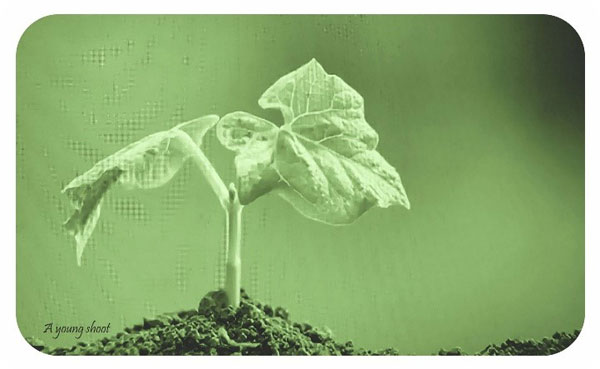
As an international manufacturer of security seals, LeghornGroup has the responsibility of using environmentally friendly materials and processes to reduce the impact of its activities on the world, activating and promoting a production and commercial model among all subjects with whom it relates based on the rule of 5 r’s and on a circular economy that strongly contrasts with the throw-away culture, which is more urgent and necessary today than ever.

